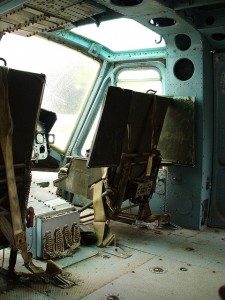Cu Chi Tunnels Ben Duoc
 Guerrilla. Spanish for little war. A strange word. After all can war ever be a “diminutive” thing?
Guerrilla. Spanish for little war. A strange word. After all can war ever be a “diminutive” thing?
Here in the Cu Chi Tunnels, the idea that war, as it is practiced by the outgunned and outnumbered, can ever be anything less than a determined, coordinated and concerted effort, certainly seems ridiculous and improbable.
“Little war” doesn’t come into it.
At the height of the Vietnam war the Cu Chi Tunnels stretched from Ho Chi Minh City to the Cambodian border and formed an impressive network that housed living quarters, storage facilities, weapons factories, hospitals, command centres and kitchens.
From this underground command centre, the Vietcong where able to launch surprise attacks on US forces, including assaults on the US Du Dong military base, before going to ground again via a system of trapdoors.
As warfare goes, you have to admire its versatility and ingenuity.
In the visitor centre they certainly take great pride in extolling the virtues of the plucky Vietcong fighter that took on the might of the US army with such cunning determination.
Before gaining access to the tunnels themselves, the visitor is encouraged to watch a quaint and naive little propaganda film that showcases the Vietcong engineering genius and proudly praises the bravery of the young communist freedom fighters.
It’s hard to stifle a giggle as the glorious fighters are benevolently compared to the “imperialist menace” that was the US.
I watch it all mesmerised and slightly aghast.
After all, we’re surrounded by US tourists here, all of whom, while not quite squirming in their seats, seem as perplexed as I am at the brutally naive presentation.
We all seem to watch each other as if to confirm that this really is something to simply laugh about now, and come the end of the show, it seems that most of us are walking around with a bemused grin on our faces.
These days there’s not much left of the network of tunnels that used to exist. Cu Chi, after all, was “the most bombed, shelled, gassed, defoliated and generally devastated area in the history of warfare”. Tom Mangold and John Perry: “The Tunnels of Cu Chi”
Today the trees have started to grow back, but, as my guide is keen to point out, this is something that has only happened in the last ten years. Prior to this, the ground was still too toxic to support any life.
As I ponder this rather horrific fact, the guide quickly sweeps a pile of leaves from the soil to reveal a very narrow wooden door.
It is perhaps 50 cm long and 30 cm wide if not narrower. In any case it is an impossibly tight opening for a door. Nevertheless, the guide slips through the opening and disappears underground pulling the latch over his head.
I stare in wonder at this lithe feat of contortion. I for one could never squeeze myself into such a space.
Back on the surface the guide just laughs.
The Americans could never follow us down here. They were too wide. Their bones are too big.
I look at my own, relatively slender build, and decide that it’s not just US Marines that wouldn’t make it down such a rabbit hole. I’d have problems with it myself.
A few metres further up, and a wider tunnel opening appears. Once again the guide scurries down into the earth and this time I am supposed to follow.
I duly comply and find myself in a sweltering hole, my shoulders scraping the ceiling as I hunker down almost on all fours in an attempt to move through the cramped tunnel.
The guide is moving swiftly ahead, quickly followed by Paolo, who scuttles along as if this underground squeeze is but a mere stroll in the park.
After 10 metres the claustrophobia and heat overwhelm me, however. I feel my heart rise to my mouth and a panic set in.
All I want to do is get out.
I’ve been down there approximately one minute and have proceeded no further than 10 meters but I cannot stand it.
I turn and head back to the entrance. The thought of crawling through that tomblike space to the exit – which is a mere 50 meters away – is just too suffocating.
Quite how anyone manage to maintain the psychological strength to live underground for years, whilst being bombarded by B-52s is beyond my understanding.
Perhaps that is what war does to the human mind? Allows you to withstand inhuman and intolerable conditions in the name of a cause. I don’t know.
One thing is for sure though.
My admiration for those that did survive down here, has increased tenfold since I sat giggling at that visitor movie.
